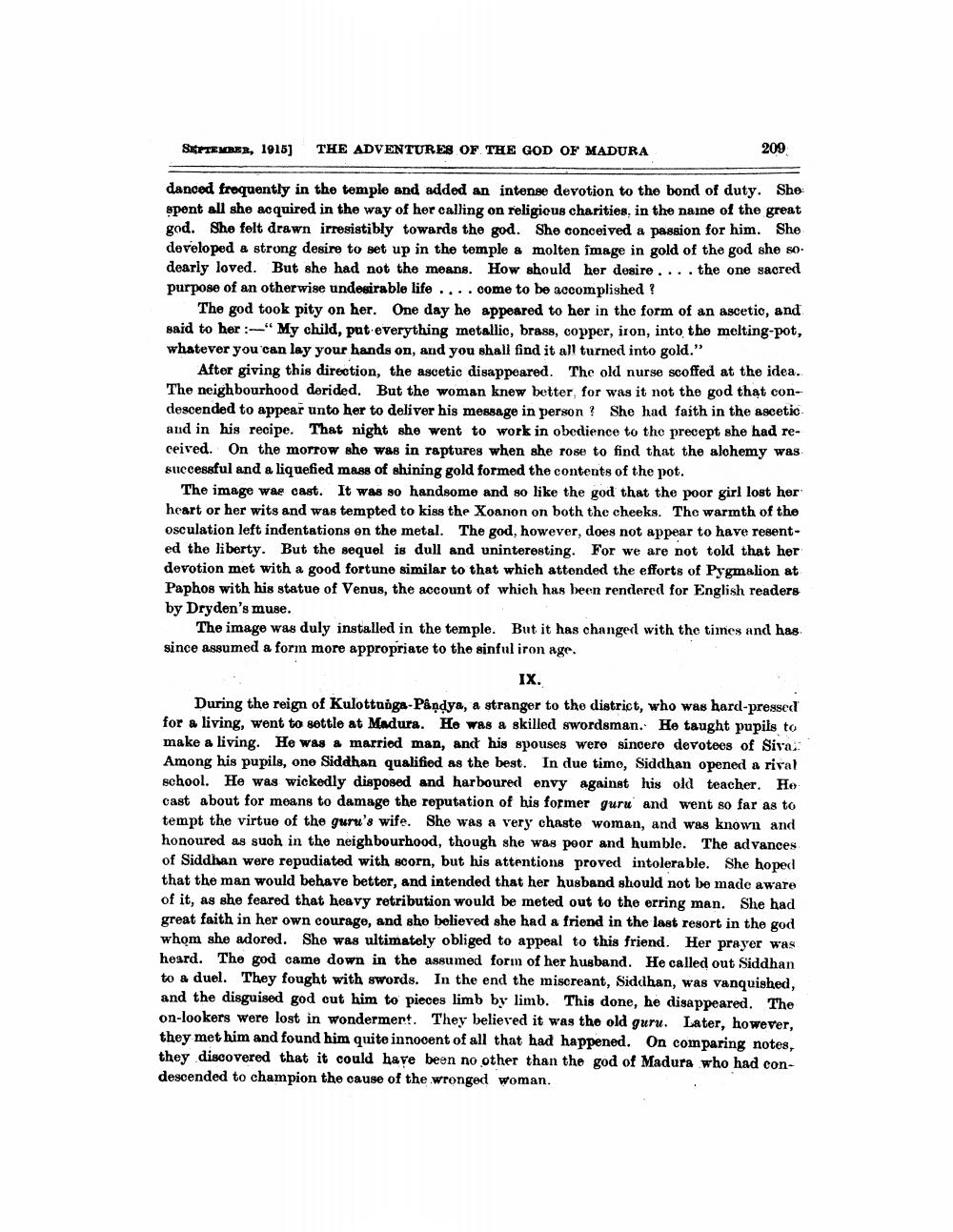________________
SEPTEMBER, 1915] THE ADVENTURES OF THE GOD OF MADURA
danced frequently in the temple and added an intense devotion to the bond of duty. She spent all she acquired in the way of her calling on religious charities, in the name of the great god. She felt drawn irresistibly towards the god. She conceived a passion for him. She developed a strong desire to set up in the temple a molten image in gold of the god she sodearly loved. But she had not the means. How should her desire.... the one sacred purpose of an otherwise undesirable life.... come to be accomplished?
The god took pity on her. One day he appeared to her in the form of an ascetic, and said to her:-"My child, put everything metallic, brass, copper, iron, into the melting-pot, whatever you can lay your hands on, and you shall find it all turned into gold."
After giving this direction, the ascetic disappeared. The old nurse scoffed at the idea. The neighbourhood derided. But the woman knew better, for was it not the god that condescended to appear unto her to deliver his message in person? She had faith in the ascetic and in his recipe. That night she went to work in obedience to the precept she had received. On the morrow she was in raptures when she rose to find that the alchemy was successful and a liquefied mass of shining gold formed the contents of the pot.
209
The image was cast. It was so handsome and so like the god that the poor girl lost her heart or her wits and was tempted to kiss the Xoanon on both the cheeks. The warmth of the osculation left indentations on the metal. The god, however, does not appear to have resented the liberty. But the sequel is dull and uninteresting. For we are not told that her devotion met with a good fortune similar to that which attended the efforts of Pygmalion at Paphos with his statue of Venus, the account of which has been rendered for English readers by Dryden's muse.
The image was duly installed in the temple. But it has changed with the times and has since assumed a form more appropriate to the sinful iron age.
IX.
During the reign of Kulottunga-Pandya, a stranger to the district, who was hard-pressed for a living, went to settle at Madura. He was a skilled swordsman. He taught pupils to make a living. He was a married man, and his spouses were sincere devotees of Siva. Among his pupils, one Siddhan qualified as the best. In due time, Siddhan opened a rival school. He was wickedly disposed and harboured envy against his old teacher. He cast about for means to damage the reputation of his former guru and went so far as to tempt the virtue of the guru's wife. She was a very chaste woman, and was known and honoured as such in the neighbourhood, though she was poor and humble. The advances of Siddhan were repudiated with scorn, but his attentions proved intolerable. She hoped that the man would behave better, and intended that her husband should not be made aware of it, as she feared that heavy retribution would be meted out to the erring man. She had great faith in her own courage, and she believed she had a friend in the last resort in the god whom she adored. She was ultimately obliged to appeal to this friend. Her prayer was heard. The god came down in the assumed form of her husband. He called out Siddhan to a duel. They fought with swords. In the end the miscreant, Siddhan, was vanquished, and the disguised god cut him to pieces limb by limb. This done, he disappeared. The on-lookers were lost in wonderment. They believed it was the old guru. Later, however, they met him and found him quite innocent of all that had happened. On comparing notes, they discovered that it could have been no other than the god of Madura who had condescended to champion the cause of the wronged woman.




